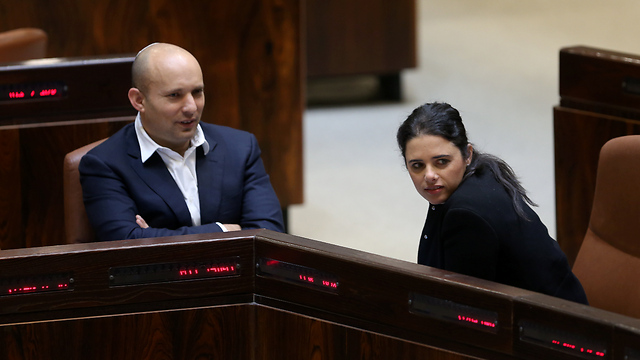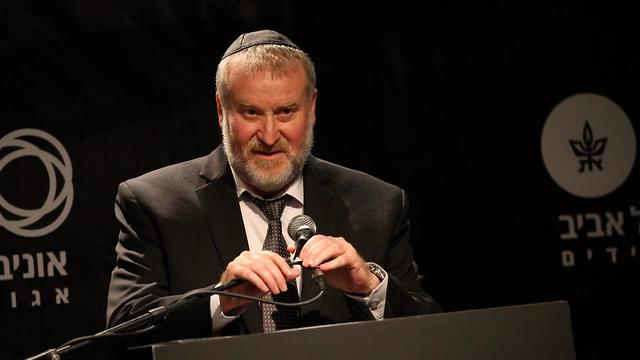
Supreme Court chief justice agrees to meet with PM on override power bill
Hayut makes meeting conditional upon postponement of Knesset committee meeting called to advance controversial bill that, in its current form, would enable government to bypass HCJ rulings by a simple MK majority of 61; AG warns bill would strip HCJ of powers.
Supreme Court Chief Justice Esther Hayut agreed Monday to meet with Prime Minister Benjamin Netanyahu next Sunday to discuss the proposed override power bill, on condition that the Ministerial Committee on Legislation meeting on the same day, which is supposed to advance the bill, is postponed by one week.
The bill, intended to bypass the High Court of Justice's rulings with the approval of a simple majority of 61 members of Knesset, became a top priority for nationalist lawmakers following the uncertainty over the fate of illegal African migrants in the aftermath of a series of failed deals for their deportation.
Netanyahu turned to Justice Minister Ayelet Shaked, who together with Minister Naftali Bennett is promoting the controversial bill, and she agreed to the postponement of the Ministerial Committee meeting.
Shaked said the meeting was delayed at Netanyahu's request, but sources close to the prime minister say that the decision to postpone the meeting stems from technical, rather than ideological, considerations, and accused Bennett and his Bayit Yehudi party of undermining the coalition.
"Once again, a media spin by the Bayit Yehudi party, which does not miss an opportunity to distort the facts and undermine the nationalist camp. At the last meeting of the heads of the coalition, it was agreed that immediately after Independence Day, the prime minister and justice minister would meet with the chief justice of the Supreme Court," the source said.
"Since the justice minister is flying abroad at the end of the week, the meeting with the Supreme Court president was postponed to Sunday, and consequently the vote was postponed as well. That is the reason for the postponement, and there is no other reason," the source insisted.
Ministers Bennett and Shaked plan to submit for a vote their proposal for Basic Law: Legislation, which includes the notwithstanding clause, enabling the Knesset to override a bill that has been rejected by the High Court of Justice and re-legislate it by way of a simple majority of only 61 out of 120 MKs.
Chief Justice Hayut is expected to strongly oppose the idea of a simple majority currently being mooted and promoted by the bill's backers.
As an alternative, the court may be amenable to the law that overrides its rulings on the proviso that such a move garners a majority of at least 80 MKs. Hayut is expected to express her firm opposition in the meeting with Netanyahu, joined by Justice Hanan Melcer.
It is widely assumed, however, that Hayut will compromise and consent to a required majority of 75 MKs. The Likud and Kulanu parties agree on a majority of 65 MKs.
Last week, Netanyahu met with former Supreme Court Chief Justice and "father of the constitutional revolution" Aharon Barak, who expressed his opposition to the proposed legislation in its current form. He called the proposal by Bennett and Shaked a "poisonous pill that would destroy human rights In Israel."
The decision to hold the meeting was made following Attorney General Avichai Mandelblit's appeal to Netanyahu during a coalition meeting convened to discuss the prime minister's initiative to enact a broad overriding power clause.
Mandelblit told the prime minister and coalition ministers that in the current climate and in the absence of a dialogue with the Supreme Court justices, or at least the Supreme Court chief justice, the process to implement the move would come to a standstill.
At the ministerial meeting, Mandelblit raised a number of international models which contain “notwithstanding clauses.” The attorney general explained that the model that he and the judicial system would accept was legislation of a clause that would be included in a new Basic Law: Legislation, proposed by Ministers Bennett and Shaked.
However, Mandelblit has rejected the notion that High Court decision could be disregarded through reapproval of a law by a meager 61 MKs, advocating instead a minimum requirement of 70 MKs—a number he believes would prevent any coalition from bypassing the HJC as and when it pleases.
In a speech delivered recently, Mandelblit said that the plan set out by Shaked and Bennett would be translated as “a serious blow to Israeli democracy.”
According to Mandelblit, the meaning of the notion that a simple majority of 61 Knesset members suffices for deciding on the override bill essentially constitutes a comprehensive removal of the HCJ's authority and its role to protect minorities.
“It makes it more difficult for the court to make effective constitutional reviews. Accepting this would bring about, in my opinion, a serious blow to Israeli democracy. This is a lack of understanding of the term of ‘majority rule,’” Mandelblit demurred.
The British model, the attorney general said, which empowers the high court to only recommend that a law be struck down, could not be adopted. This law, he explained, fundamentally differs from that which is practiced in Israel and therefore cannot be emulated.
Finance Minister Moshe Kahlon’s suggestion could also not be adopted, Mandelblit said, which would have seen the ratification of the override bill that would only have been applicable to the illegal migrants, which he described as “patch work.”
In his opinion, the exclusion of a particular issue from the HCJ’s authority would constitute a precedent and a slippery slope, after which every political group would strive to pursue its own interest.
Offering one hypothetical example, he said that such a precedent would enable the Haredi parties to argue that the issue of military conscription should also fall outside the HCJ’s authority.
Mandelblit therefore, concluded that granting the Knesset the power to ratify legislation that has already been struck down by the HCJ would be unconstitutional with a narrow majority of 61 MKs and would almost entirely strip the court of its ability to defend human rights.
Moreover, it would adversely affect vulnerable segments of the society. “We are talking about groups who need constitutional protection more than anybody,” he concluded.













